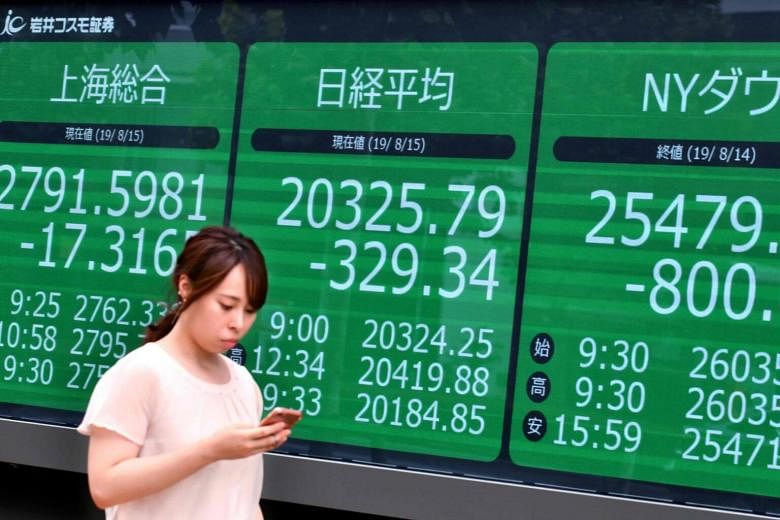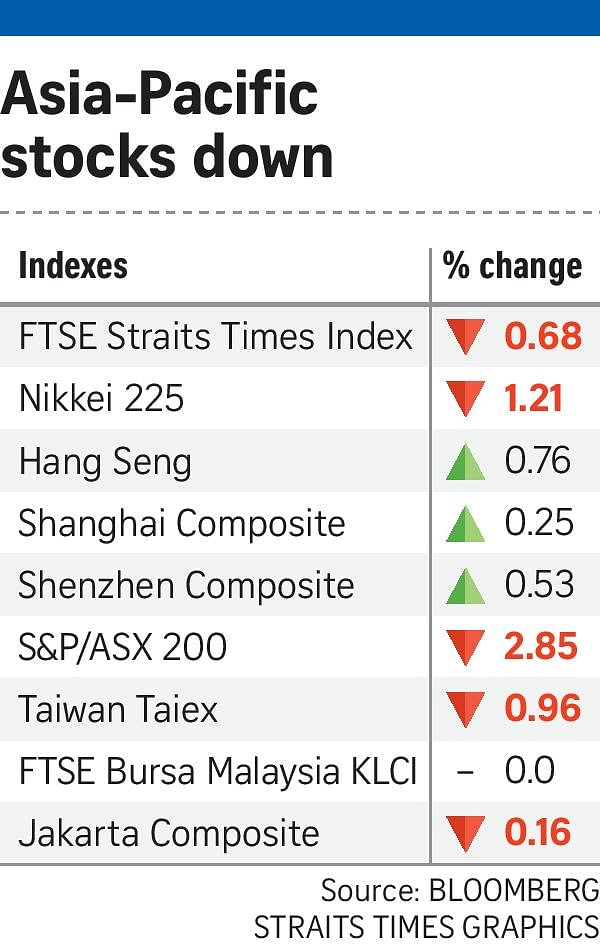Taking their cue from a bloodbath on American bourses, stock markets retreated across many parts of Asia amid fears of a recession in the United States and clear signs of a slowdown in two other major economies, China and Germany.
While it was a key indicator on the US bond markets that triggered the rout, observers pointed out that escalating trade tensions had contributed to the gloom.
This only deepened yesterday when China threatened to hit back at the US over its threat to impose 10 per cent tariffs on US$300 billion (S$417 billion) in traded goods. It refused to be mollified even after the US said it would put some of these hikes on hold.
"China will have to take the necessary countermeasures," its Finance Ministry said yesterday, spreading immediate panic among European stock markets.
A semblance of calm, however, returned to the US markets yesterday. A positive outlook for Walmart saw the blue-chip Dow opening 100 points, or 0.4 per cent, higher.
In an interconnected world in which markets take their cues from each other, the same Dow, along with indexes such as the S&P 500 and the Nasdaq Composite, had started the earlier panic by plunging 3 per cent on Wednesday.
This spread to Asia yesterday, with Australia's S&P/ASX 200 diving 2.9 per cent, Japan's Nikkei closing 1.21 per cent lower and the Straits Times Index falling 0.68 per cent to touch a two-month low.
Interestingly, markets in China held firm, driven by technology stocks as Beijing backs the sector amid its clash with the US.
On the face of it, it was a technical indicator that sowed the seeds of panic in the US markets. The yield on the US Treasury 10-year note briefly fell below the two-year yield, a historic sign of an impending recession.
The so-called "inverted yield curve" - in which yields on short-term bonds are higher than on long-term bonds - means that people are so worried about the near-term state of the economy that they put their money in safer, long-term investments. This pushes up the prices of long-term bonds and lowers their yields.
Maybank Kim Eng economist Chua Hak Bin noted that the "last three episodes of yield curve inversions were in 1991, 2001 and 2008, all of which were followed by US recessions".
Worse still, the US-China trade war shows no signs of abating while economies are hurting. "There are indeed grounds for worry because growth outlook for key global economies are souring, with Germany bordering on technical recession and Japan at risk of dipping into recession next year," said analysts from United Overseas Bank.
Earlier this week, the German economy, which is Europe's largest, shrank, China posted the weakest industrial output growth since 2002, while Singapore has downgraded its growth forecast for the year .
CIMB Private Banking economist Song Seng Wun said that indicators are flashing warning signals at a time when the market is extremely sensitive to the possibility of a recession. "The market is already looking to the darker side," he said.
Others pointed out that the market panic might force the US Federal Reserve to cut rates at its September policy meeting - something that President Donald Trump has been demanding.
But economist Mohamed El-Erian told CNBC that cuts come at a price. "The more it (the Fed) cuts, the less impact it has on the economy, the less impact it has on markets and the greater the risk they have no ammunition when they will really need to cut," he said.



